(完整版)unit5新编实用英语
- 格式:ppt
- 大小:12.36 MB
- 文档页数:37
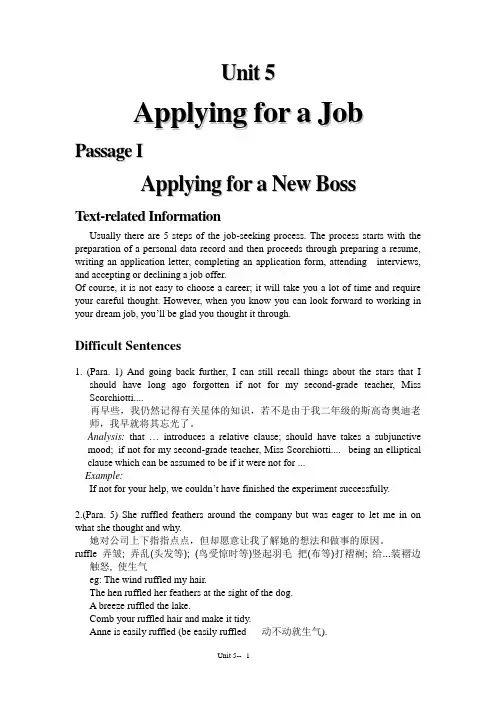
U n i t5A p p l y i n g f o r a J o bP a s s a g e IA p p l y i n g f o r a N e wB o s sT ext-related InformationUsually there are 5 steps of the job-seeking process. The process starts with the preparation of a personal data record and then proceeds through preparing a resume, writing an application letter, completing an application form, attending interviews, and accepting or declining a job offer.Of course, it is not easy to choose a career; it will take you a lot of time and require your careful thought. However, when you know you can look forward to working in your dream job, you’ll be glad you thought it through.Difficult Sentences1. (Para. 1) And going back further, I can still recall things about the stars that Ishould have long ago forgotten if not for my second-grade teacher, Miss Scorchiotti....再早些,我仍然记得有关星体的知识,若不是由于我二年级的斯高奇奥迪老师,我早就将其忘光了。
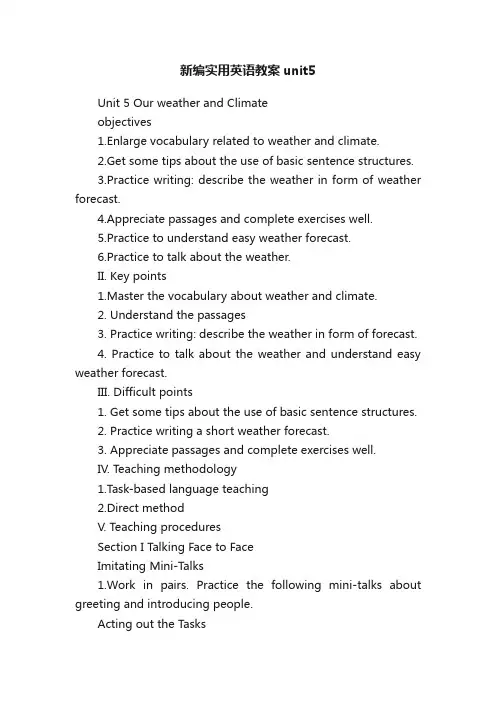
新编实用英语教案unit5Unit 5 Our weather and Climateobjectives1.Enlarge vocabulary related to weather and climate.2.Get some tips about the use of basic sentence structures.3.Practice writing: describe the weather in form of weather forecast.4.Appreciate passages and complete exercises well.5.Practice to understand easy weather forecast.6.Practice to talk about the weather.II. Key points1.Master the vocabulary about weather and climate.2. Understand the passages3. Practice writing: describe the weather in form of forecast.4. Practice to talk about the weather and understand easy weather forecast.III. Difficult points1. Get some tips about the use of basic sentence structures.2. Practice writing a short weather forecast.3. Appreciate passages and complete exercises well.IV. Teaching methodology1.Task-based language teaching2.Direct methodV. Teaching proceduresSection I Talking Face to FaceImitating Mini-Talks1.Work in pairs. Practice the following mini-talks about greeting and introducing people.Acting out the Tasks2.Work in pairs and act out the tasks by following the above mini-talks. Key for reference:1.Task: Ask for Mark’s comments on the weather.2.Task: Ask about and describe the weather at this time of year.3.Task: Ask Mr. Green about the weather condition tomorrow and plan an activity.4.Task: Talk about the change of the weather from long rainy days.5.Task: Complain about a cold day.Studying Weather Forecasts3.A weather forecast id a statement that tells the public what the weather condition is going to be. We need to watch weather forecasts on TV or hear them over the radio every is part of our the following samples of weather forecasts carefully and try to use the information to practice short dialogues.Following Sample Dialogues4.Read the following sample dialogues and try to perform your own tasks. Putting Language to Use5.Mr. Parks is talking about the weather of two places in the United States with her aloud the following dialogue with your partner by putting in the missing words.6.There is going to be s sports meet is worried about the weather and you are talking about it. Fill in the blanks according to the clues given in the brackets. Then act it out with your partner.1.Listen to 10 sentences for workplace communication cross-referenced with their Chinese translations.Script: 1. It look likes rain.2. Is it going to be fine this weekend3. There is a chance of snow this evening.4. Today will be cool and partly cloudy, with a chance of rain this afternoon.5. What’s the temperature today2.Listen to the following sentences for workplace communication in ColumnA and match each one with its Chinese version in Column B.3.Listen to 6 sentences for workplace communication and choose their right responses.Handling a Dialogue4.Listen to a dialogue and decode the message by finding out the correct choices in the brackets according to what you have heard. Understanding a Short Speech/Talk5.Now listen to a short speech/talk and fill up the blanks according to what you have heard.The words in brackets will give you some hints.6.Listen to the speech/talk again and complete the information in ColumnA with the right choices in Column B.Section III Trying Your HandPracticing Applied Writing1.Read the following two samples of weather report and learn to write your own.2.Translate the following weather forecast into Chinese, using the data bank in the Workbook for reference.3.Write an English weather report according to the information given in Chinese.Writing Sentences and Reviewing Grammar4. Analyze the following sentences to see what tense they belong to .5. Correct the errors in the following sentences.6. Translate the following sentences into English.Keys for the exercise:1)The weather was terrible yesterday. In fact, it has been awful.2)She has worked in this office for five years.3)I paid a visit to the Great Wall last year and had a very good timethere.4)We have never spoken to each other since we quarreled last time.5)Turn down the TV a bit, the weather forecast hasn’t begun yet. Write and Describe a PictureWrite a short passage of about 100 words to tell a story or about an event related to the picture given below. Some useful words and phrases have been provided to help you.Section IV Maintaining a Sharp EyePassage one/doc/2b9714159.htmlrmation Related to the Reading Passage/doc/2b9714159.htmlnguage Points:3.Explanation of Difficult Sentences1) Climate change may be a big problem,but there are many little things we can do to make a difference.Analysis: May can be used to introduce concession in putting forward an argument.2)As we have learned, these greenhouse gases trap energy in the atmosphere and make the Earth warmer.Analysis:As is often used to introduce an indicator of theinformation source, such as as we have learned. Similar structure are:as the saying goes,as everyone knows, as you know,as you put it,etc.3) By turning off lights, the television,and the computer when you are through with them, you can help a lot.Analysis: By is followed by a gerund, introducing a prepositional phrase of ,by is not necessarily always translated as “通过”.4)One of the ways to reduce the amount of greenhouse gases that we put into the air is to buy products that don’t use as much energy. Analysis:Two That-clauses are used to serve as post-modifiers of nouns:the first one is that we put into the air, modifying greenhouse gases;The second that-clause is that don’t use as much energy, modifying products.Note: In translation, the noun phrase products that use as much energ y can simply be translated into”节能产品”, instead of “不消耗那么多能量的产品”.B. Important Words1)trap:v store(energy, gas or water,etc.)so that it cannot escape.2)Stand-by:n. Readiness for duty.3)Absorb:v. Take in,sack up (liquid,heat,knowledge,etc.)4)Membership: n. Being a member of (an organization)5)Swell:v. (number or amounts) grow bigger; expand.4. Passage Translation5. Read and Think: Answer the following questions according to the passage.6. Read and Complete1)Complete each of the following statements with words or phrases fromthe passage.2)Fill in the blanks with the proper words or expressions given below,changing theform if necessary.7. Read and Translate8. Read and SimulatePassage twoInformation Related to the Reading Passage/doc/2b9714159.htmlnguage Points:A.Explanation of Difficult Sentences1) The most important thing to remember about the weather in Britain is that it often changes.Analysis: To remember about ...is the post modifier of the sentence subject the most important thing, and that introduces the complement clause.2) As it is not very common in Britain to have long periods when theweather stays the same day after day, the kind of weather you get will depend not only on the time of year, but also on the luck.Analysis: Within the as-clause of reason, there is a relative clause introduced by when and modifying periods. And in its main clause, there is another relative clause you get modifying weather, with the relative that omitted.3)For example, the opportunities for people to meet outside depend a lot on the weather, so you won’t see people meeting or spending time together outdoors as much as you do in hotter countries.Analysis:for people to meet outside modifies meeting or spending time together are the object complement of verb see, and do refers to see...4)Foreigners are often amused that the British people spend so much time discussing the weather.Analysis:That is often used to introduce a clause which gives the cause or the effect of an adjective, just like amused in this case.5)Another reason is that the British people are reluctant to converse about personal matters with people who are not friends.Analysis:Here that introduces a subject-complement clause, in which a relative who-clause modified people.6) A comment on a nice day or a personal complaint about the rain is an easy way to break the ice.Analysis:Note that when or is used to coordinate two subjects, the verb must agree with the subject after or. To break the ice is an infinitive clause modifying an easy way.B. Important Words1)depend: v. according to(no passive)B. Need someone or something for help or to be able to live.2)opportunity:n. A favorable moment or occasion (for doing sth.)3)Outdoors:ad. In the open air4)Amuse:v. Make someone laugh;cause laughter in5)Climate: n. The average conditions at a particular place over a period of year.6)Discuss:v. Talk about7)Variable:a. Changeable, not steady8)Reluctant:a. Unwilling and therefore perhaps slow to act.9)Converse:v. Talk informally10)Personally:a. Belonging or relating to a particular person, not to others11)Social: to leisure activities that involve meeting other people12)Comment:v. Make a remark, give an opinion2.Passage Translation3.Read and Judge: True/False4.Read and Translate: Translate the following sentences into Chinese.1)the most important thing to remember about British is the weather.2)People in Britain can enjoy the lovely weather most of the year.3)British people tend to talk about weather quite a lot.4)It is quite common in Britain for people to comment on a rainy day or an lovely day at a bus stop.5)The eating habits of people in Britain have a lot to do with the weather conditions there.6)The best we may use to describe the weather in Britain is “predictable”.7)The variable weather explains why British people talk a lot about it.8)Talking about weather is an inoffensive way to begin a conversationwith a stranger in Britain.Section V Appreciating Culture Tips (Open.)。
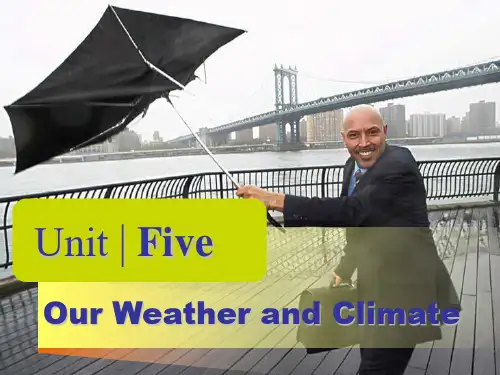

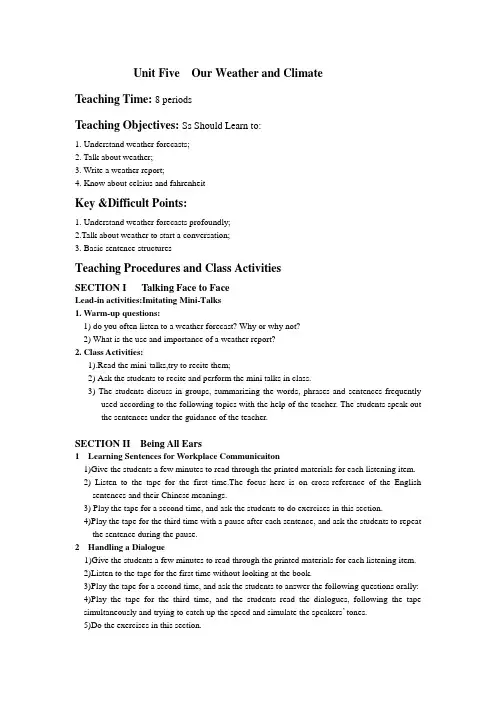
Unit Five Our Weather and ClimateTeaching Time: 8 periodsTeaching Objectives: Ss Should Learn to:1. Understand weather forecasts;2. Talk about weather;3. Write a weather report;4. Know about celsius and fahrenheitKey &Difficult Points:1. Understand weather forecasts profoundly;2.Talk about weather to start a conversation;3. Basic sentence structuresTeaching Procedures and Class ActivitiesSECTION I Talking Face to FaceLead-in activities:Imitating Mini-Talks1. Warm-up questions:1) do you often listen to a weather forecast? Why or why not?2) What is the use and importance of a weather report?2. Class Activities:1).Read the mini-talks,try to recite them;2) Ask the students to recite and perform the mini talks in class.3) The students discuss in groups, summarizing the words, phrases and sentences frequentlyused according to the following topics with the help of the teacher. The students speak out the sentences under the guidance of the teacher.SECTION II Being All Ears1 Learning Sentences for Workplace Communicaiton1)Give the students a few minutes to read through the printed materials for each listening item.2) Listen to the tape for the first time.The focus here is on cross-reference of the Englishsentences and their Chinese meanings.3) Play the tape for a second time, and ask the students to do exercises in this section.4)Play the tape for the third time with a pause after each sentence, and ask the students to repeatthe sentence during the pause.2 Handling a Dialogue1)Give the students a few minutes to read through the printed materials for each listening item.2)Listen to the tape for the first time without looking at the book.3)Play the tape for a second time, and ask the students to answer the following questions orally:4)Play the tape for the third time, and the students read the dialogues, following the tape simultaneously and trying to catch up the speed and simulate the speakers’ tones.5)Do the exercises in this section.3 Understanding a Short Speech/Talk1)Give the students a few minutes to read through the printed materials for each listening item.2)Listen to the tape for the first time without looking at the book.3) Play the tape for a second time, and ask the students to do the exercises in this section.4)Play the tape for the third time with a pause after each sentence, and ask the students to takenotes of the key words.SECTION III Trying Your HandPracticing Applied Writing1 Sample analysis: T eacher summarizes briefly the format and language used in weather forecasts. The teacher may show the following passage with PPT (If there is no PPT prepared, ask the students to take a dictation of the passage). Afterwards, ask the students to read it and translate it into Chinese orally.2Simulated writing:1)The students read and translate the sample weather forecasts with the help of the teacher.2)Do Exercises 2, 3 and 4 in groups.SECTION IV Maintaining a Sharp EyePassage 1 We can Make a Difference1 Warm-up questions: What is the consequences of global warming?2 Guided reading aloud of the passage:The students read the passage individually. The teacher should pay attention to correcting the students’ pronunciation and intonation.3 Explanation of difficult words and expressions:The students have a discussion in groups to pick out the difficult words and expressions in the whole passage which they don’t understand and report them to the class. The teacher will demonstrate the usage of those chosen points, and then ask the students to make up at least two sentences with them in groups.Key Language Points in Teacher’s Book1) trap:store---so that it cannot escape. Eg: A filter can trap dust from the air.2)stand-by:readiness for duty.Eg: The soldiers are on stand-by, ready to set out at any time.3)stuff:things. Eg: There is a lot of stuff about in today’s newspaper.4)membership:being a member of an organization. eg:He lost his membership card and was denied access.5)swell:grow bigger. Eg: The population swelled during that time.4 Understanding the passage in detail:1)Paragraph 1:Group work: Give the students 3 minutes to prepare the translation of the firstparagraph, and then an oral class presentation is required.2)Paragraph 2: Ask one or two students to read this paragraph.3)Paragraph 3: 1) Pair work: One student reads this paragraph loudly, and another helps correcthis or her pronunciation. And then they change their roles to do the same work again. 2) Work together to summarize the general idea of Para. 3, and then present it in class.5 Summary of the passage Group work: The students have a discussion of the main idea of the passage. The students’ ideas may vary, and the teacher gives his or her own idea.6 Assignments for this section: 1. Recite Paragraphs 2 and 3 2. Preview Passage II.PASSAGE II The British Like Talking About the Weather1 Warm-up activities: How do the British generally start their coversations?2 Guided reading aloud of the passage:The students read the passage and get its general idea.3 Explanation of difficult words and expressions:Choose language points in Language Points in Teacher’s Book4 Understanding the passage in detail:Paragraph 1: 1) The students read this paragraph together.2) Dictation practice: The teacher reads each sentence of the paragraph for or three times accordingto the students’ English level, and the students write them down. Afterwards, the students check up them with their partners.Paragraph 2:1) Ask two or three students to read the paragraph individually.2) Pair work: One student asks about 2 or 3 specific questions about Paragraphs 2, and the otherone gives the answers. Then the students exchange their roles to do the same work again. The rest of the passage: 1) The students read this part following the teacher.2) Group work: The teacher draws the following table on the blackboard (or shows it withPPT), and then asks the students to have a group discussion for matching the greeting sentences in Column A with the countries they are spoken in Column B. In the end, the whole class try to pronounce the greeting words in different languages.5Summary of the passage:1)Group work: The students have a discussion to translate the passage into Chinese.2)Groups work: Each group tries to pick out at least 5 expressions or sentences from thepassage witch they think are worth remembering. Afterwards, ask some groups to write them down on the blackboard and ask the whole class to read them aloud.6 Assignments for this section:Read the passage again.。
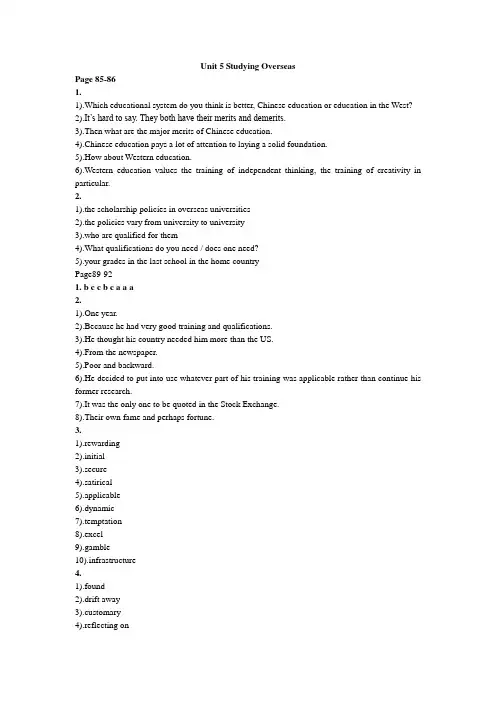
Unit 5 Studying OverseasPage 85-861.1).Which educational system do you think is better, Chinese education or education in the West?2).It’s hard to say. They both have their merits and demerits.3).Then what are the major merits of Chinese education.4).Chinese education pays a lot of attention to laying a solid foundation.5).How about Western education.6).Western education values the training of independent thinking, the training of creativity in particular.2.1).the scholarship policies in overseas universities2).the policies vary from university to university3).who are qualified for them4).What qualifications do you need / does one need?5).your grades in the last school in the home countryPage89-921. b c c b c a a a2.1).One year.2).Because he had very good training and qualifications.3).He thought his country needed him more than the US.4).From the newspaper.5).Poor and backward.6).He decided to put into use whatever part of his training was applicable rather than continue his former research.7).It was the only one to be quoted in the Stock Exchange.8).Their own fame and perhaps fortune.3.1).rewarding2).initial3).secure4).satirical5).applicable6).dynamic7).temptation8).excel9).gamble10).infrastructure4.1).found2).drift away3).customary4).reflecting on5).amazement6).secure7).overseas8).career9).experiences10).professionally5.1).I have to warn you that you cannot spend in excess of your income.2).As the project is quite difficult technically, nobody is in a position to complete it alone.3).His three years of hard work overseas paid off —he is now the CEO of a big joint venture.4).Many Chinese students studying overseas take the plunge and return to help develop their home country when they complete their studies.5).When the fire broke out all kinds of animals poured / ran out from all nooks and crannies.6).The ever-increasing income has made studying overseas available to children from average families.7).The achievements made by China in many hi-tech sectors come near or even surpass those made by the developed countries in the West.6.1).It is very unlikely that she would stay abroad to make a living.Under such circumstances it is quite unlikely that we would be able to succeed.2).This justified the reasons why I had refused them.The high level of difficulty justified the reasons why the project progressed slowly.3).The efforts they have made to improve the relations between the two countries have earned them accolades.The contributions China has made to world peace have won her a good reputation in international affairs.4).According to a survey male students tend to play games online, whereas female students tend to chat online.The husband wants a house, whereas the wife would rather live in a flat.5).In trying to understand others you’re likely to be understood.In helping the poor areas to develop their economy we also developed ourselves.Passage IReturn to Home Country: A Thirty-Year Perspective from Nigeria回到祖国:尼日利亚30 年生活回顾1968 年,我在就读尼日利亚拉各斯医学院的最后一年获得了一年的博士前奖学金,就去了美国纽约州罗切斯特市罗切斯特大学医学院深造。

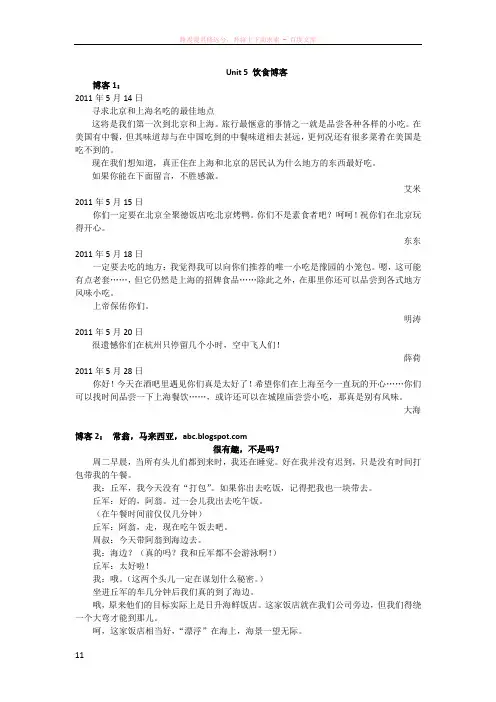
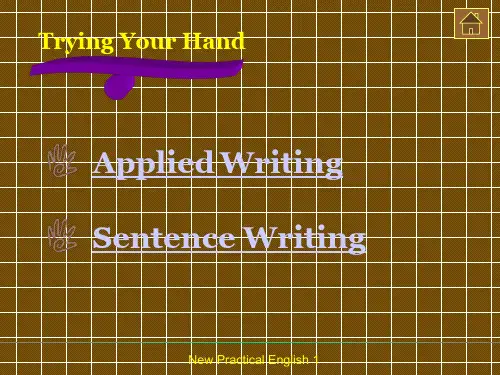
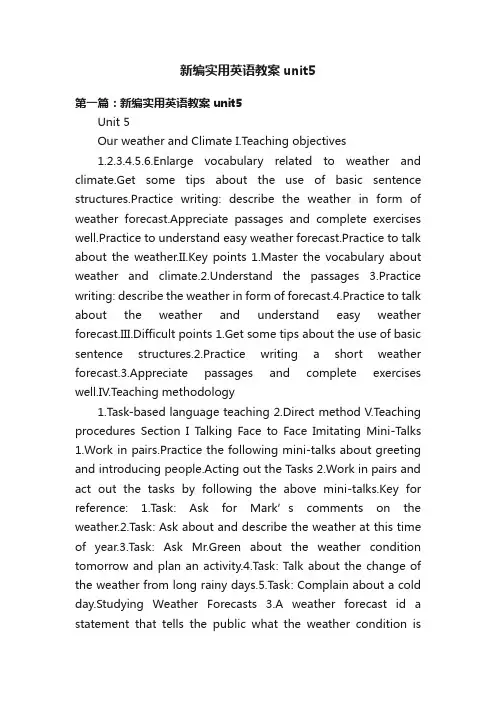
新编实用英语教案unit5第一篇:新编实用英语教案unit5Unit 5Our weather and Climate I.Teaching objectives1.2.3.4.5.6.Enlarge vocabulary related to weather and climate.Get some tips about the use of basic sentence structures.Practice writing: describe the weather in form of weather forecast.Appreciate passages and complete exercises well.Practice to understand easy weather forecast.Practice to talk about the weather.II.Key points 1.Master the vocabulary about weather and climate.2.Understand the passages 3.Practice writing: describe the weather in form of forecast.4.Practice to talk about the weather and understand easy weather forecast.III.Difficult points 1.Get some tips about the use of basic sentence structures.2.Practice writing a short weather forecast.3.Appreciate passages and complete exercises well.IV.Teaching methodology1.Task-based language teaching2.Direct method V.Teaching procedures Section I Talking Face to Face Imitating Mini-Talks 1.Work in pairs.Practice the following mini-talks about greeting and introducing people.Acting out the Tasks 2.Work in pairs and act out the tasks by following the above mini-talks.Key for reference: 1.Task: Ask for Mark’s comments on the weather.2.Task: Ask about and describe the weather at this time of year.3.Task: Ask Mr.Green about the weather condition tomorrow and plan an activity.4.Task: Talk about the change of the weather from long rainy days.5.T ask: Complain about a cold day.Studying Weather Forecasts 3.A weather forecast id a statement that tells the public what the weather condition isgoing to be.We need to watch weather forecasts on TV or hear them over the radio every day.It is part of our life.Read the following samples of weather forecasts carefully and try to use the information to practice short dialogues.Following Sample Dialogues4.Read the following sample dialogues and try to perform your own tasks.Putting Language to Use5.Mr.Parks is talking about the weather of two places in the United States with her students.Read aloud the following dialogue with your partner by putting in the missing words.6.There is going to be s sports meet tomorrow.Bob is worried about the weather and you are talking about it.Fill in the blanks according to the clues given in the brackets.Then act it out with your partner.1.Listen to 10 sentences for workplace communication cross-referenced with their Chinese translations.Script:(e.g)1.It look likes rain.2.Is it going to be fine this weekend?3.There is a chance of snow this evening.4.Today will be cool and partly cloudy, with a chance of rain this afternoon.5.What’s the temperature today?2.Listen to the following sentences for workplace communication in Column A and match each one with its Chinese version in Column B.3.Listen to 6 sentences for workplace communication and choose their right responses.Handling a Dialogue4.Listen to a dialogue and decode the message by finding out the correct choices in the brackets according to what you have heard.Understanding a Short Speech/Talk5.Now listen to a short speech/talk and fill up the blanks according to what you have heard.The words in brackets will give you some hints.6.Listen to the speech/talk again and complete the information in Column A with the right choices in ColumnB.Section III Trying Your Hand Practicing Applied Writing 1.Read the following two samples of weather report and learn to write your own.2.Translate the following weather forecast into Chinese, using the data bank in the Workbook for reference.3.Write an English weather report according to the information given in Chinese.Writing Sentences and Reviewing Grammar 4.Analyze the following sentences to see what tense they belong to.5.Correct the errors in the following sentences.6.Translate the following sentences into English.Keys for the exercise: 1)The weather was terrible yesterday.In fact, it has been awful.2)She has worked in this office for five years.3)I paid a visit to the Great Wall last year and had a very good time there.4)We have never spoken to each other since we quarreled last time.5)Turn down the TV a bit, the weather forecast hasn’t begun yet.Write and Describe a Picture Write a short passage of about 100 words to tell a story or about an event related to the picture given below.Some useful words and phrases have been provided to help you.Section IV Maintaining a Sharp Eye Passage onermation Related to the Reading Passagenguage Points:3.Explanation of Difficult Sentences 1)(para.1)Climate change may be a big problem,but there are many little things we can do to make a difference.Analysis: May can be used to introduce concession in putting forward an argument.2)(para.1)As we have learned, these greenhouse gases trap energy in the atmosphere and make the Earth warmer.Analysis:As is often used to introduce an indicator of the information source, such as as we have learned.Similar structure are:as the saying goes,as everyone knows, as you know,as you put it,etc.3)(para.3)By turning off lights, the television,and the computerwhen you are through with them, you can help a lot.Analysis: By is followed by a gerund, introducing a prepositional phrase of manner.Note,by is not necessarily always translated as “通过”.4)(para.8)One of the ways to reduce the amount of greenhouse gases that we put into the air is to buy products that don’t use as much energy.Analysis:Two That-clauses are used to serve as post-modifiers of nouns:the first one is that we put into the air, modifying greenhouse gases;The second that-clause is that don’t use as much energy, modifying products.Note: In translation, the noun phrase products that use as much energy can simply be translated into”节能产品”, instead of “不消耗那么多能量的产品”.B.Important Words 1)trap:v store(energy, gas or water,etc.)so that it cannot escape.2)Stand-by:n.Readiness for duty.3)Absorb:v.Take in,sack up(liquid,heat,knowledge,etc.)4)Membership: n.Being a member of(an organization)5)Swell:v.(number or amounts)grow bigger;expand.4.Passage Translation 5.Read and Think: Answer the following questions according to the passage.6.Read and Complete1)Complete each of the following statements with words or phrases from the passage.2)Fill in the blanks with the proper words or expressions given below, changing theform if necessary.7.Read and Translate 8.Read and Simulate Passage two Information Related to the Reading Passage nguage Points: A.Explanation of Difficult Sentences 1)(para.1)The most important thing to remember about the weather in Britain is that it often changes.Analysis: To remember about...is the post modifier of the sentence subject the most important thing, and that introduces the complement clause.2)(para.1)As it is not very common in Britain to have longperiods when the weather stays the same day after day, the kind of weather you get will depend not only on the time of year, but also on the luck.Analysis: Within the as-clause of reason, there is a relative clause introduced by when and modifying periods.And in its main clause, there is another relative clause you get modifying weather, with the relative that omitted.3)(para.2)For example, the opportunities for people to meet outside depend a lot on the weather, so you won’t see people meeting or spending time together outdoors as much as you do in hotter countries.Analysis: for people to meet outside modifies opportunities.Both meeting or spending time together are the object complement of verb see, and do refers to see...4)(para.3)Foreigners are often amused that the British people spend so much time discussing the weather.Analysis: That is often used to introduce a clause which gives the cause or the effect of an adjective, just like amused in this case.5)(para.4)Another reason is that the British people are reluctant to converse about personal matters with people who are not friends.Analysis:Here that introduces a subject-complement clause, in which a relative who-clause modified people.6)(Para.4)A comment on a nice day or a personal complaint about the rain is an easy way to break the ice.Analysis:Note that when or is used to coordinate two subjects, the verb must agree with the subject after or.To break the ice is an infinitive clause modifying an easy way.B.Important Words1)depend: v.A.change according to(no passive)B.Need someone or something for help or to be able to live.2)opportunity:n.A favorable moment or occasion(for doing sth.)3)Outdoors:ad.In the open air 4)Amuse:v.Make someone laugh;cause laughter in 5)Climate: n.The average conditions at aparticular place over a period of year.6)Discuss:v.Talk about 7)Variable:a.Changeable, not steady 8)Reluctant:a.Unwilling and therefore perhaps slow to act.9)Converse:v.Talk informally 10)Personally:a.Belonging or relating to a particular person, not to others 11)Social:a.relating to leisure activities that involve meeting other people 12)Comment:v.Make a remark, give an opinion 2.Passage Translation 3.Read and Judge: True/False 4.Read and Translate: Translate the following sentences into Chinese.1)the most important thing to remember about British is the weather.2)People in Britain can enjoy the lovely weather most of the year.3)British people tend to talk about weather quite a lot.4)It is quite common in Britain for people to comment on a rainy day or an lovely day at a bus stop.5)The eating habits of people in Britain have a lot to do with the weather conditions there.6)The best we may use to describe the weather in Britain is “predictable”.7)The variable weather explains why British people talk a lot about it.8)Talking about weather is an inoffensive way to begin a conversation with a stranger in Britain.Section V Appreciating Culture Tips(Open.)第二篇:新编实用英语教案案首新编实用英语教案案首课程名称:新编实用英语Unit 1一、基本信息单元标题:unit1 Invitations 项目训练名称:Speaking And Writing 教学目标与要求: 1.能力目标:After learning this, the students should learn to make an oral invitation and write an invitation card or a letter for personal invitation or official occasions..They also can give a reply to an oral invitation and awritten invitation 知识目标:The words, the phrases and sentences about the invitations.二、学习重点与难点:1.The new words and phrases2.The sentences about the invitations3.The invitation cards or letters三、课时安排:2课时四、教法设计:讲授法、谈话法、讨论法、读书指导法、练习法五、教学用具:新编实用英语教案内容一、教学方法及建议:本单元设计利用任务驱动、情景模式教学,课堂上以学生活动为主,以锻炼学生分析问题,尝试解决问题、总结问题,最后真正解决问题的能力为目标,教师适当的引导,达到培养职业能力为主的目的。

Unit Five Our Weather and ClimateTeaching Time: 8 periodsTeaching Objectives: Ss Should Learn to:1.Understand weather forecasts;2.Talk about weather;3.Write a weather report;4.Know about celsius and fahrenheitKey &Difficult Points:1. Understand weather forecasts profoundly;2.Talk about weather to start a conversation;3. Basic sentence structuresTeaching Procedures and Class ActivitiesSECTION I Talking Face to FaceLead-in activities:Imitating Mini-Talks1.Warm-up questions:1)do you often listen to a weather forecast? Why or why not?2)What is the use and importance of a weather report?2.Class Activities:1).Read the mini-talks,try to recite them;2)Ask the students to recite and perform the mini talks in class.3)The students discuss in groups, summarizing the words, phrases and sentences frequentlyused according to the following topics with the help of the teacher. The students speak out the sentences under the guidance of the teacher.SECTION II Being All Ears1 Learning Sentences for Workplace Communicaiton1)Give the students a few minutes to read through the printed materials for each listening item.2)Listen to the tape for the first time.The focus here is on cross-reference of the Englishsentences and their Chinese meanings.3)Play the tape for a second time, and ask the students to do exercises in this section.4)Play the tape for the third time with a pause after each sentence, and ask the students to repeatthe sentence during the pause.2 Handling a Dialogue1)Give the students a few minutes to read through the printed materials for each listening item.2)Listen to the tape for the first time without looking at the book.3)Play the tape for a second time, and ask the students to answer the following questions orally:4)Play the tape for the third time, and the students read the dialogues, following the tape simultaneously and trying to catch up the speed and simulate the speakers ’tones.5)Do the exercises in this section.3 Understanding a Short Speech/Talk1)Give the students a few minutes to read through the printed materials for each listening item.2)Listen to the tape for the first time without looking at the book.3) Play the tape for a second time, and ask the students to do the exercises in this section.4)Play the tape for the third time with a pause after each sentence, and ask the students to takenotes of the key words.SECTION III Trying Your HandPracticing Applied Writing1 Sample analysis: Teacher summarizes briefly the format and language used in weather forecasts. The teacher may show the following passage with PPT (If there is no PPT prepared, ask the students to take a dictation of the passage). Afterwards, ask the students to read it and translate it into Chinese orally.2 Simulated writing:1)The students read and translate the sample weather forecasts with the help of the teacher.2)Do Exercises 2, 3 and 4 in groups.SECTION IV Maintaining a Sharp EyePassage 1 We can Make a Difference1Warm-up questions: What is the consequences of global warming?2Guided reading aloud of the passage: The students read the passage individually. The teacher should pay attention to correcting the students ’pronunciation and intonation.3 Explanation of difficult words and expressions:The students have a discussion in groups to pick out the difficult words and expressions in the whole passage which they don ’tunderstand and report them to the class. The teacher will demonstrate the usage of those chosen points, and then ask the students to make up at least two sentences with them in groups. Key Language Points in Teacher ’ s Book1) trap:store---so that it cannot escape. Eg: A filter can trap dust from the air.2)stand-by:readiness for duty.Eg: The soldiers are on stand-by, ready to set out at any time.3)stuff:things. Eg: There is a lot of stuff about in today’s newspaper.4)membership:being a member of an organization. eg:He lost his membership card andwas denied access.5)swell:grow bigger. Eg: The population swelled during that time.4Understanding the passage in detail:1)Paragraph 1: Group work: Give the students 3 minutes to prepare the translation of the firstparagraph, and then an oral class presentation is required.2)Paragraph 2: Ask one or two students to read this paragraph.3)Paragraph 3: 1) Pair work: One student reads this paragraph loudly, and another helps correcthis or her pronunciation. And then they change their roles to do the same work again. 2) Work together to summarize the general idea of Para. 3, and then present it in class.5Summary of the passage Group work: The students have a discussion of the main idea of the passage. The students’ideas may vary, and the teacher gives his or her own idea.6Assignments for this section: 1. Recite Paragraphs 2 and 3 2. Preview Passage II.PASSAGE II The British Like Talking About the Weather1 Warm-up activities:How do the British generally start their coversations?2 Guided reading aloud of the passage:The students read the passage and get its general idea.3 Explanation of difficult words and expressions:Choose language points in Language Points in Teacher ’ s Book 4Understanding the passage in detail:Paragraph 1: 1) The students read this paragraph together.2) Dictation practice: The teacher reads each sentence of the paragraph for or three times accordingto the students ’English level, and the students write them down. Afterwards, the students check up them with their partners.Paragraph 2: 1) Ask two or three students to read the paragraph individually.2)Pair work: One student asks about 2 or 3 specific questions about Paragraphs 2, and the otherone gives the answers. Then the students exchange their roles to do the same work again.The rest of the passage: 1) The students read this part following the teacher.2)Group work: The teacher draws the following table on the blackboard (or shows it with PPT),and then asks the students to have a group discussion for matching the greeting sentences in Column A with the countries they are spoken in Column B. In the end, the whole class try to pronounce the greeting words in different languages.5 Summary of the passage:1)Group work: The students have a discussion to translate the passage into Chinese.2)Groups work: Each group tries to pick out at least 5 expressions or sentences from thepassage witch they think are worth remembering. Afterwards, ask some groups to write them down on the blackboard and ask the whole class to read them aloud.6Assignments for this section:Read the passage again.。